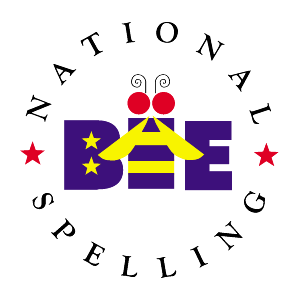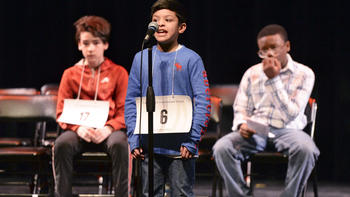The National Spelling Bee
The Scripps National Spelling Bee takes place each year at the end of May, at a location near Washington, D.C. Featuring nearly 300 contestants, the event is seen as a national championship of spelling, and students from around the world practice fiercely in order to qualify. Contestants are primarily from the U.S. but have also been from America Samoa, the Bahamas, Canada, Ghana, Guam, Jamaica, New Zealand, Puerto Rico, and the U.S. Virgin Islands. Contestants must be younger than 15, must have not completed the 8th grade, and must not be previous winners. No minimum age has been set.
Participants make liberal use of the national bee's official study booklet, Spell It!, which is published by Merriam-Webster. Regional bees use a the School Pronouncer's Guide, which incorporates the entire text of Spell It!, along with a selection of other words from Merriam-Webster's Third New International Dictionary. Regional bees consist primarily of round after round of contestants' being asked to spell words correctly, with numbers of remaining contestants dwindling based on incorrect answers. The national bee, which is effectively a championship, has a slightly different setup. In Round One, contestants take a computerized test that features prompts to enter correct spelling words and also prompts to answer multiple choice vocabulary questions. Round One was previously a written test, with contestants responding to verbal prompts. The current, computerized format began in 2013. Round Two and Round Three are oral rounds, with contestants speaking into a microphone on stage to spell a word correctly. Contestants get two minutes into which to speak their answer; before they do so, they may ask judges for the following:
Contestants who misspell words are eliminated. In Round Four, contestants again take to computers, to again do both spelling and vocabulary work. This round is known as the Semifinal Round.
The winner of the National Spelling Bee receives from Scripps:
The winner also receives $5,000 from the Sigma Phi Epsilon Educational Education and, from K12 Inc., a Nook eReader and a free entry into an online course. In the realm of popular entertainment, the winner will also be booked in as a guest on a few national TV talk shows. Other contestants receive cash prizes in descending numbers based on their order of finish, from $500 to $30,000. All contestants eliminated before the Semifinals Round receive $100. All contestants, regardless of their performance, receive a $100 U.S. Savings Bond, an eReader, an electronic copy of the Unabridged Webster's Third New International Dictionary, and a free one-year membership to the Encyclopedia Britannica Online Premium service. The National Spelling Bee began in 1925, with a handful of contestants, drawn from a large number of local spelling bees around the U.S. The first national bee took place in Louisville and was sponsored by the Louisville Courier-Journal. Frank Neuhauser, 11 at the time, spelled gladiolus correctly and was the last contestant standing. The spelling bee has long had an association with newspapers, and these entities still sponsor local and regional bees, out of which come the contestants that take part in the national competition, which has taken place every year since, except 1943–1945 (during World War II). The winner received $500 for many years. The 1925 winner received that amount in gold. The very next year, the winner's prize was $1,000. Organizers dropped the winning prize back to $500 in 1933, during the Great Depression. It wasn't until 1956 that the winner's prize went back up to 1956. Organizers raised the winner's prize to $1,500 in 1987 and to $5,000 in 1993. Only nine students participated in the first national bee. Not until 1950 did the contestants number 50. The national bee was a one-day affair until 1958; the year before, organizers named co-champions because the contestants had exhausted the word list and the bee had lasted most of a day. The number of contestants first reached 100 in 1978. The number has climbed steadily since then. Because of the growing number of contestants, organizers added a third day of competition, in 2001, and then implemented a written test the following year in order to eliminate some contestants and keep the oral rounds at two days. Other facts:
|
|
Social Studies for Kids
copyright 2002–2024
David White



 To qualify for the national bee, a student must win a regional competition. Each U.S. state or territory or foreign country can run a regional bee; some American regional bees cover an entire state, and others cover several counties. Rules in regional bees do not necessarily have to be as strict as those employed at the national bee.
To qualify for the national bee, a student must win a regional competition. Each U.S. state or territory or foreign country can run a regional bee; some American regional bees cover an entire state, and others cover several counties. Rules in regional bees do not necessarily have to be as strict as those employed at the national bee. Round Five and Round Six are oral rounds. All contestants return to speaking their answers onstage. Contestants who misspell words are eliminated. Rounds continue until all but one contestant has misspelled a word. The remaining contestant is the champion. (Organizers named co-champions in 1950, 1957, 1962,
Round Five and Round Six are oral rounds. All contestants return to speaking their answers onstage. Contestants who misspell words are eliminated. Rounds continue until all but one contestant has misspelled a word. The remaining contestant is the champion. (Organizers named co-champions in 1950, 1957, 1962, 
